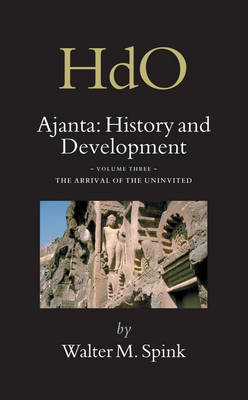Handbook of Oriental Studies. Section Two, India
1 total work
Ajanta: History and Development, Volume 3 The Arrival of the Uninvited
by Walter Spink
Published 28 October 2005
Volume Three in the Ajanta series focuses on what the site tells us about what happened in the months following the death of emperor Harisena (478 A.D.).
In that year the great "Vakataka" patrons had to flee from Ajanta as a result of the Asmakas' takeover of the site. When soon the Asmakas themselves also had to leave because of the needs of war, the great phase of patronage ended at Ajanta. But now a host of pious intruders, mostly monks and devotees still living in the region, could make their own offerings, generally violating the original patrons' programs. In this systematic cave to cave treatment, it is shown through careful interpretation of the physical evidence, that remarkably these new and "uninvited" paintings and sculptures appear only on and/or in caves which had already been dedicated by the earlier patrons. By contrast, excavations where the Buddha image had not been completed, were never utilized for such votive donations.
In that year the great "Vakataka" patrons had to flee from Ajanta as a result of the Asmakas' takeover of the site. When soon the Asmakas themselves also had to leave because of the needs of war, the great phase of patronage ended at Ajanta. But now a host of pious intruders, mostly monks and devotees still living in the region, could make their own offerings, generally violating the original patrons' programs. In this systematic cave to cave treatment, it is shown through careful interpretation of the physical evidence, that remarkably these new and "uninvited" paintings and sculptures appear only on and/or in caves which had already been dedicated by the earlier patrons. By contrast, excavations where the Buddha image had not been completed, were never utilized for such votive donations.
